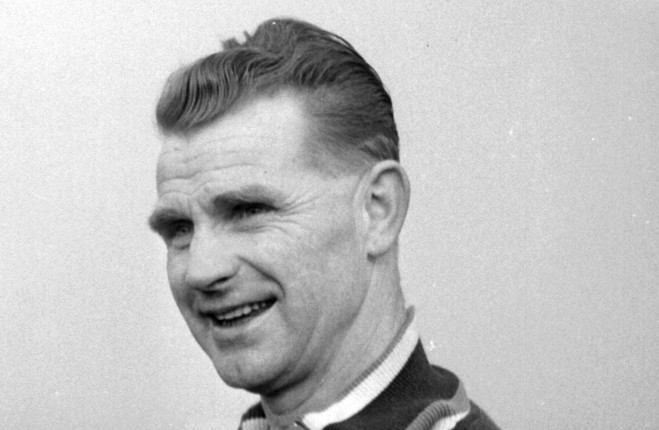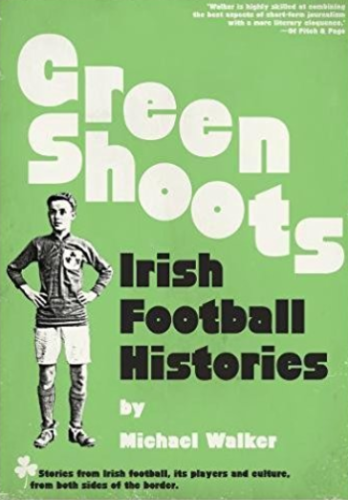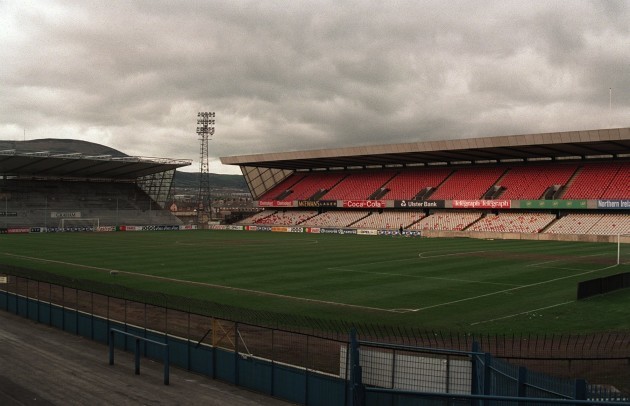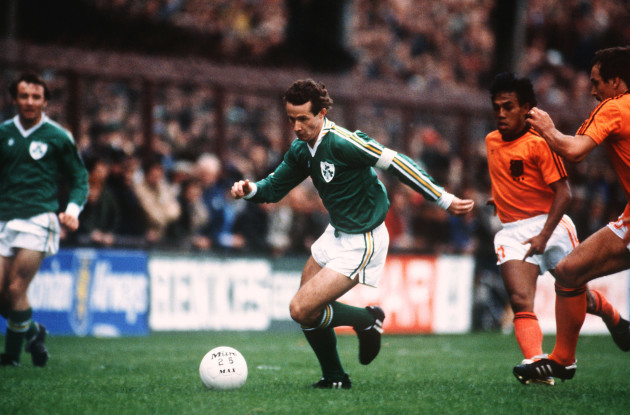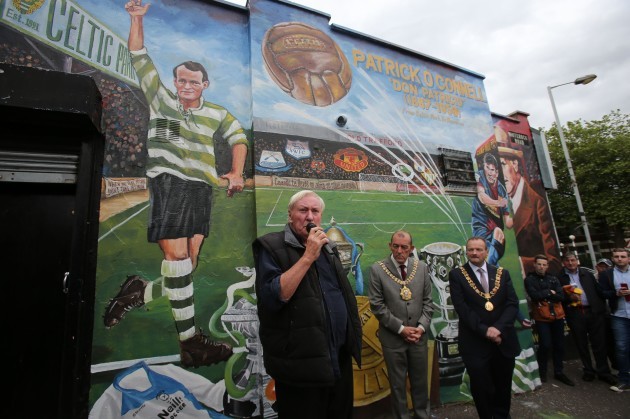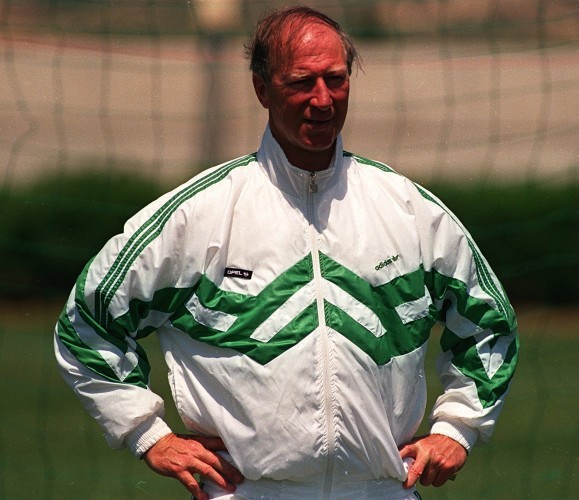FOOTBALL HAS A history of forgetting its heroes.
A good example of this unfortunate tendency was evident in November 2015. Most football followers will know that Leicester’s Jamie Vardy became the first Premier League player to score in 11 consecutive matches by breaking the deadlock in the Foxes’ 1-1 draw with Man United. Many will also be aware that in doing so, he eclipsed the run of former Red Devils striker Ruud van Nistelrooy, who had scored in 10 games on the trot in 2003.
What not as many people will know, however, is the identity of the individual who continues to hold the all-time record to this day.
During the 1931-32 season, Irishman Jimmy Dunne scored for Sheffield United in 12 league games on the trot — a record even Vardy could not equal or surpass. Yet too often, people are quick to hail the England international while overlooking the feats of the Irish footballing legend.
Overall, Dunne would score more than 100 goals for Sheffield United, yet as if to further underline the point, a search for his name on the Blades’ official website proves fruitless.
The Ringsend native is not the only Irishman who has made a notable impact on the course of footballing history and yet oddly seems to have been almost airbrushed out of it to an extent.
Moreover, consider the following names: Patrick O’Connell, Bill McCracken, William McCrum and Peter Doherty.
Even those who believe themselves to be avid Irish footballing fans are likely to be unfamiliar with at least one of them.
Yet all of the aforementioned individuals deserve to be remembered for some major achievements in the game.
Westmeath-born O’Connell played for Man United before managing Real Betis and Barcelona among others, coaching the latter during a financially rewarding tour of Mexico and the United States amid the chaos the Spanish Civil War.
In addition to making over 400 appearances for Newcastle, Belfast native McCracken was such an accomplished defender that he played a major role in bringing about changes to the offside law in 1925.
The inventor of the penalty kick, William McCrum, was also Irish, having been born in Milford, County Armagh.
Derry-born Peter Doherty may not have contributed to the laws of the game the way McCrum or McCracken did, but he was clearly quite uniquely gifted, scoring 200 goals over the course of a 20-year career in English football. Harry Gregg played with both Doherty and George Best, claiming the former was a superior footballer. In addition, before Lionel Messi or Johan Cruyff did likewise (see video above), Doherty was the first person on record to come up with the rather unorthodox idea of laying a penalty kick to a team-mate.
All these tales and many more are highlighted in a new book by journalist and author, Michael Walker — Green Shoots: Irish Football Histories. It undertakes the ambitious task of exploring the history of football in Ireland on both sides of the border, managing to do so in a relatively concise, entertaining and insightful fashion, in the process attempting to celebrate some of the more overlooked but nonetheless key figures in particular.
“I remember growing up hearing stories about Peter Doherty,” Walker tells The42. “And people in Dublin will have grown up hearing stories about Jimmy Dunne. Yet they don’t get enough recognition.
“I was really keen to bring up their achievements. And I know Jimmy Dunne got some recognition when Jamie Vardy was chasing his record and didn’t get it, but I went to Sheffield library, week by week, to check what the newspapers were saying about him (at the time).
“I do think there’s a post-1992 attitude to football, and I did consciously want to get as many stories from the old days as possible and speak to as many people who were there, because they won’t be around forever.”
And was the aforementioned Doherty really better than Best, as Gregg suggests?
“I’m not sure many would agree with Harry Gregg, but the fact that he played with both and so was able to compare makes him a valid witness.
“But Peter Doherty was definitely one of the motivations behind the book. I wanted to bring out how overlooked he was. And the Messi penalty, the fact that it just happened during the research of the book emphasised that (Doherty) was a man who was thinking about this (many years ago).
“I quote a few people calling Peter Doherty a genius, but I could have quoted loads more. Everyone who ever met him seems to have called him a genius. So he clearly was this man with an amazing aura.”
So given their various impressive achievements, why do the likes of Doherty, McCracken and McCrum seem to get forgotten so easily?
I don’t know if it’s so easily,” Walker says. “Bill McCracken was really famous in his era, but his era was from 1900 to 1925 as a player really. 1925 was a long time ago, however, I’m amazed that no one remembers him. At least with William McCrum, some people remember him. And there is a bust in Milford in County Armagh in his village that acknowledges what he did.
“But there’s no mention of McCracken in the street of the Falls Road, where he comes from. I just walked up and down the street and had access to some of his personal papers, which was very fortunate. They were all addressed from Nanson Street, where he lived. I went outside the house and there was nothing.
“He didn’t do it alone, but this man was 70-80% why the offside law changed. Yet his name is unknown in Ireland. I don’t think many people have heard of him, unless you’re really into the tactical history of football, or you’re a Newcastle United fan, because he did it for Newcastle United. But he should be celebrated, he really should.”
And it’s not just the players, the history of Irish football in general tends to be all too readily forgotten in certain instances. For instance, ever hear about the time the Irish team felt obliged to give the Nazi salute before a game against Germany in 1939?
“If it wasn’t an order, it was an obligation,” Walker explains. “They weren’t just told by the Nazis, they were told by the Football Association of Ireland (FAI).
“To go back to that era, England had been there the year before and they had given the Nazi salute as well.
“The Irish players weren’t unique in that respect. They were doing what other people did. It was just the done thing. From an FAI perspective, they were still struggling to get opposition.
Germany was a big nation to get on board. To get a match against them said you were (a serious team). The FAI started out with nothing. They didn’t have the international prestige, so they had to build it. That (match takes place) only 18 years after the FAI are founded.
“They are mainly playing Poland, Hungary, Spain — countries sympathetic to the Irish national side’s cause. They are the only countries who would play them. Scotland don’t play the Republic of Ireland until the 1960s — that’s amazing. I didn’t know that when I was researching the book. It shows how limited the FAI’s options were.”
In modern times, with football regarded as an extremely accessible sport loved by billions, it’s easy to forget that Irish and British-based stadiums were once considered highly dangerous places.
‘Green Shoots’ explores this turbulent era, including the four-year period where Northern Ireland were forced to play their matches away from Windsor Park during the height of the Troubles.
“Belfast Celtic came to an end after a riot at Windsor Park in 1948 — that was 20 years before the modern Troubles. So the streets of Belfast were still sectarian, dangerous streets. Then the Troubles come in and the Northern Ireland team can’t play at home for four years.
“(The chapter) begins with the death threat to George Best. Even though I was growing up in Belfast at the time, it still takes you back. You forget so much and go back and go: ‘Bloody hell, that was quite a big deal.’
“When I spoke to Martin O’Neill about his career, I mentioned the Yugoslavia game and Martin didn’t remember that they formed a guard of honour. He just remembered it being a really emotional, important occasion.
It gives you an indication of how important it was that the Irish team lined up and gave Yugoslavia a guard of honour simply for turning up in Belfast — no one else would.
“It was a pretty amazing thing, and that was the first football match I ever went to. And I hadn’t remembered it either.
“Even as a boy, you knew that this was rare, this was an event, because you hadn’t been able to see the team playing at home. I knew it was a real moment in Irish football, but I hadn’t remembered that detail about the players lining up and applauding the Yugoslavs onto the pitch.
“If you see the footage on YouTube or wherever, for some of us, it’s really emotional.”
Of course, sectarianism and other forms of bigotry extended to all aspects of Irish life and even threatened to impact on the dreams of arguably the Republic’s greatest ever footballer. Liam Brady, who was famously expelled from his school for choosing to play soccer rather than GAA.
“It seems to have been the culture,” Walker says. “Liam Brady is quite critical of the Catholic Church and their grip on society — their conservatism and what he considers to be their small mindedness.
He comes from urban soccer Ireland. Not everyone can be a Gael from a village in Kerry. He was saying: ‘I’m different, but I’m Irish, and this is the game I want to play. Just because you tell me it’s foreign, it isn’t to me, it’s my game.’
“He was very brave and clearly from a very resilient family. His father must have been a tough man to put up with it. But then again, his father must have seen his son play football and thought: ‘What a boy we have here.’”
Despite Irish football’s more recent association with a long-ball approach, before the Jack Charlton era, it had been primarily thought of as the preserve of skillful footballers like Brady and John Giles, often replete with an emphasis on patient, technically accomplished build-up play.
Even in the present, Wes Hoolahan could be seen as being part of this tradition, though his small stature meant his talent was underestimated for years, restricting him to stints in the League of Ireland and England’s lower tiers.
I had the good fortune just to go and watch Wes for 90 minutes,” Walker recalls. “And actually watch him, not anybody else, just focus on him playing for Norwich at Sheffield Wednesday. He was in a losing team — they were thumped that day. But he just didn’t give up.
“People could say he’s one of those ‘casual’ players, and that’s why he doesn’t get picked all the time, but he isn’t a casual player. He just doesn’t convince people for whatever reason and that’s probably to do with stature and his style of play. Creative players are always trying to make a difficult pass, whereas average midfielders are playing the sideways, safe pass, so they don’t get the same degree of criticism.
“But I think (Wes) represents a clear style of Irish football. I think he represents Liam Brady, John Giles and Danny Blanchflower – he’s not as good as them, but he is part of that kind of tradition.
“I don’t think of Irish football as kick-and-rush football. I think of physically small midfielders – Michael Hughes, even Roy Keane wasn’t physically that big. It’s definitely a managerial choice.
“But I think both O’Neills come at it from a realistic perspective (in terms of the talent at their disposal). They would both like to play more expansive football.”
Yet while Hoolahan and Brady were both effectively ostracised from the national team at various points, that was mere misfortune. Perhaps the most infamous example of a neglected Irish football man has genuinely tragic undertones. Just how did Patrick O’Connell — whose achievements have only been properly acknowledged in recent years — go from being a Man United player as well as managing Real Betis and Barcelona, to dying penniless and being buried in an unmarked grave?
“His achievements were happening in Spain,” Walker says. “Even Liam Brady in Italy in the 1980s didn’t get much coverage. If he was playing for Juventus against Sampdoria, Sean Ryan would write a column in the Irish Independent at the time that covered that game, but no one else was (reporting on him).
“So Liam Brady was having this brilliant career in the 1980s without any Irish eyes on it.
“Patrick O’Connell was doing this in the ’20s and ’30s, so there just wasn’t going to be that level of coverage. That’s why he goes unrecognised and he wouldn’t have been well paid, so I think that’s why he dies a pauper.
“If he did have money, he’d have spent it, because he seemed a fairly colourful character.
But to go from being manager of Barcelona to complete anonymity in an unmarked grave — that’s an amazing contrast.”
More recently, Irish football’s tendency to be its own worst enemy can be seen in the turbulent position so many League of Ireland clubs find themselves in on a regular basis.
“I think it should be an all-Ireland league,” Walker says. “If you set aside politics, which isn’t easy, and your concern is Irish football, and what it produces, then there should be an all-Ireland league tomorrow. The facilities should be improved — I think you would feel that effect 10 years down the line. The League of Ireland deserves far more respect than it gets.
“I think it’s more realistic to get an all-Ireland league (as opposed to an all-Ireland soccer team), because it’s not as controversial politically. There’s a sporting and economic logic behind it. If you can just say: ‘We’re doing this for sporting and economic reasons,’ away you go. You just need someone to push it.
“Dundalk play really good football. These clubs just need help and investment from the authorities. I really wish them well. I enjoyed meeting the people trying to keep things afloat at Crusaders in Belfast. It is a few years since I’ve been up to see Finn Harps, but when I was up there, I was thinking: ‘The volunteers are keeping this going.’ They deserve help, gratitude and a bit of recognition, but as far as I can see, they don’t get enough.”
Perhaps then, given this history of neglect, it is not surprising that it took an outsider to inspire what remains Irish football’s most successful era.
Unlike McCracken, McCrum and Doherty, the achievements of Jack Charlton are surely not in danger of being overlooked or forgotten about anytime soon, given that his side ultimately transcended sport, making an impact on the political and cultural landscape of the time too.
Walker adds: “One of the interesting things was that (Jack) went to the ’86 World Cup having been appointed as manager, I went back to one of his autobiographies and he says: ‘What I saw there was that everybody played the same game.’ The purpose of every move was to free the midfield playmaker. He said: ‘We’ll just do something different.’
“So his methods can be characterised as one-dimensional, but there was thought behind them. It was: ‘Why don’t we (challenge) this with a completely different gameplan?’ It worked. People didn’t like playing against it, and lots of people didn’t like to watch it, but it was effective. It got them across the line, which then increases a sense of self-esteem.
“There were casualties along the way like Liam Brady and it does seem a waste of resources, but it had the effect of getting Ireland to the party, which they’d never been at.
“Whenever I went back and reviewed that, it’s what struck me most, the desire to be there. ‘It doesn’t matter how we play, at least we’re there.’
The people who were part of it felt (Jack) had a broader social impact in terms of attitudinal change. He changed how people felt about the English and the tricolour.
“So he did have a social impact, but he didn’t start the Celtic Tiger. It’s part of other things. Ryanair and cheap travel changed how Irish people dealt with England. Whenever I went to England, I went on a boat. Once you had access to cheap flights, it became a different relationship. And the Irish pub (abroad), I think that changed how people viewed Ireland as well.”
Green Shoots: Irish Football Histories is published by deCoubertin Books. More info here.
Subscribe to The42 podcasts here:
